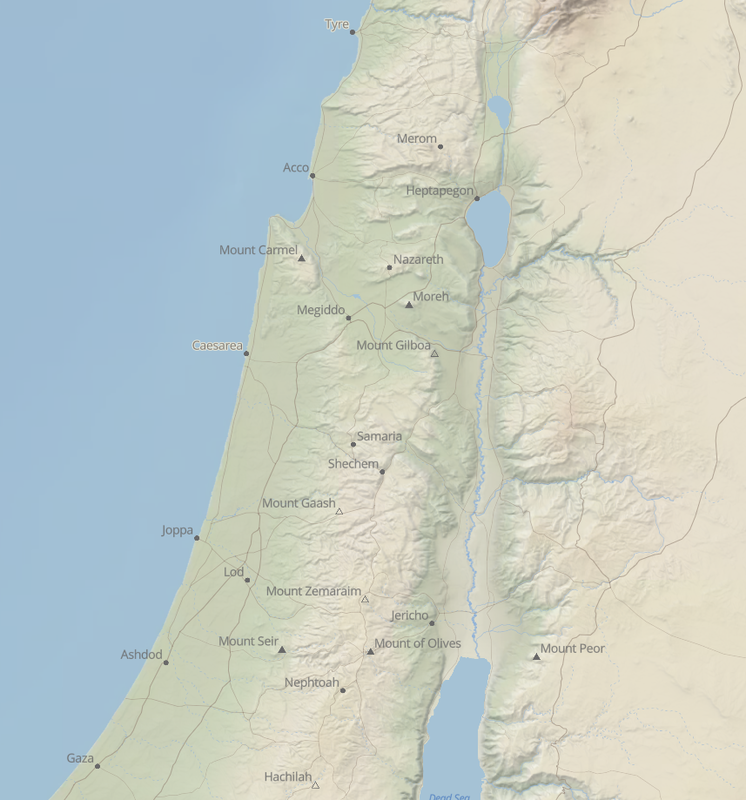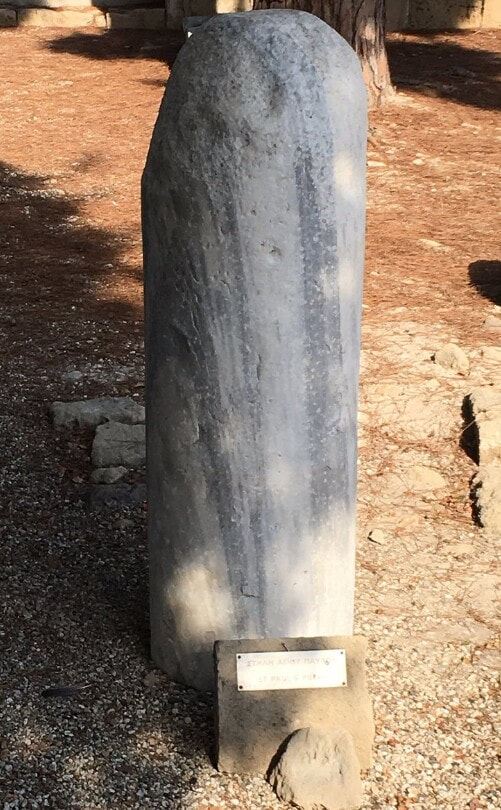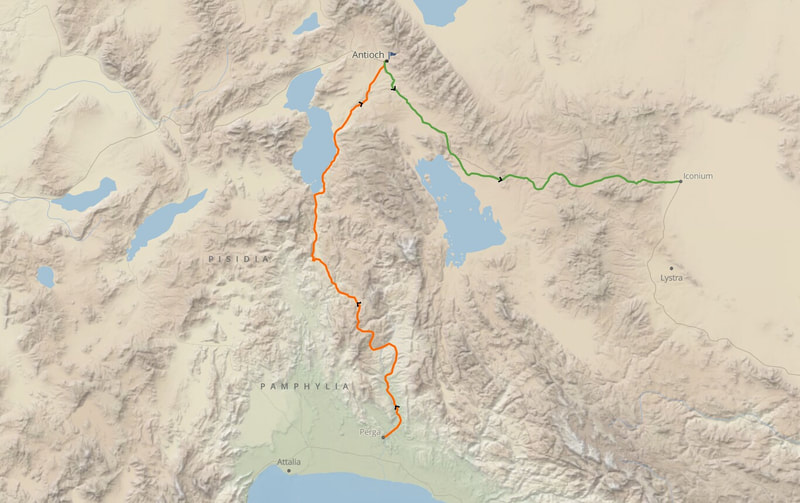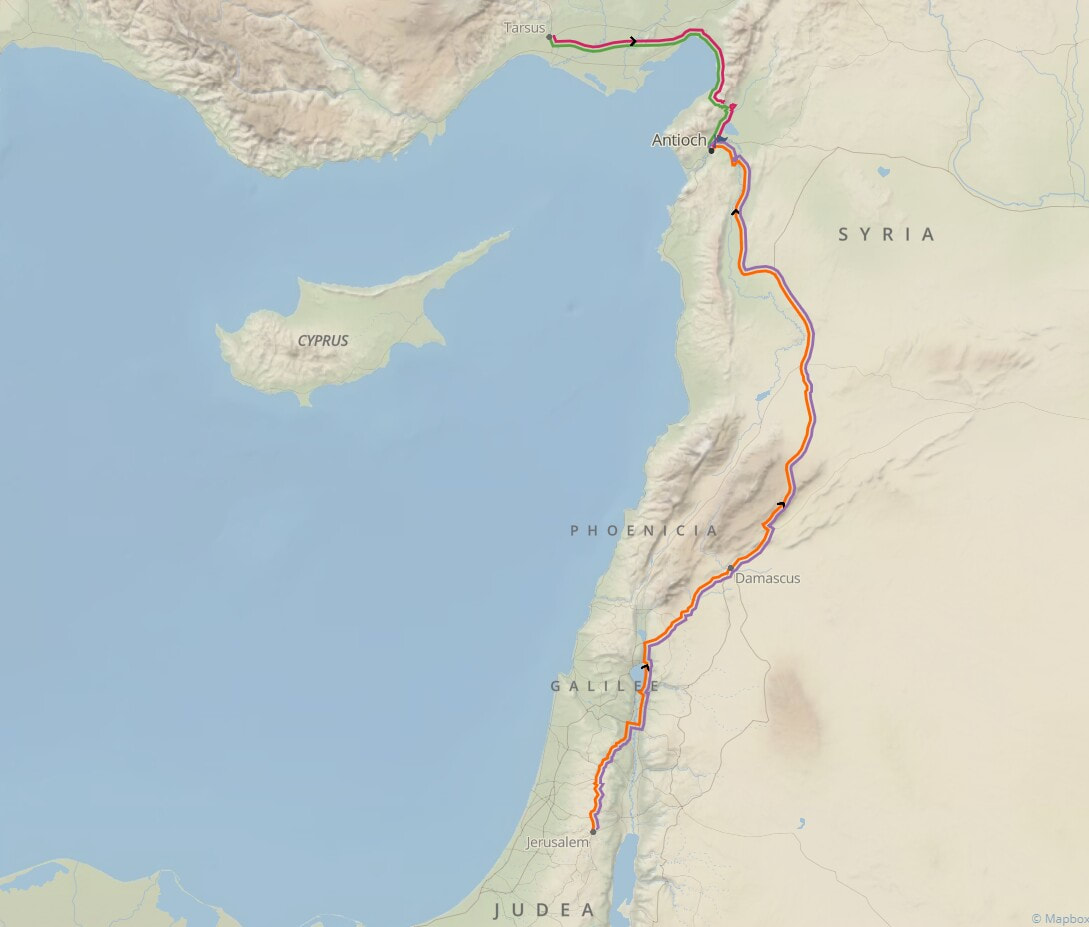| Teacher: Rusty Kennedy Series: Acts |
Rusty's Notes | |
18 At daylight, there was a great commotion among the soldiers as to what had become of Peter. 19 After Herod had searched and did not find him, he interrogated the guards and ordered their execution. Then Herod went down from Judea to Caesarea and stayed there.
- If a guard permitted a prisoner to escape, Roman law required that he receive the same punishment that the prisoner would have received, even if it was death (see Acts 16:27; 27:42).
- This law did not strictly apply in Herod’s jurisdiction, so the king was not forced to kill the guards; but, being a Herod, he did it anyway.
- Instead of killing one man to please the Jews, he killed four and perhaps hoped it would please them more.[1]
- Show Map of Caesarea
HEROD’S DEATH
- August 1, 44 AD
- The Jewish historian Josephus said that this scene took place during a festival honoring Claudius Caesar, and that the king wore a beautiful silver garment in honor of the occasion.
- We do not know what Herod said in his oration, but we do know why he said it: he wanted to impress the people.[2]
- As he speaks, the public utters out: “You are more than a mortal; you are a god!”
- Herod does not rebuke the people, but accepts their impious flattery. Immediately, the angel of the Lord strikes him down.
- According to Josephus’ account, Herod complains of intestinal pains and is removed from the crowds.
- He suffers with stomach pains for five days until he dies.
- The cause of death is intestinal worms that eat his insides.[3]
- The first 12 chapters of Acts are dominated by Peter. The remainder of Acts shifts to Paul.
- At the beginning of Acts 12, Herod seemed to be in control and the church was losing the battle.
- But at the end of the chapter, Herod is dead and the church—very much alive—is growing rapidly!
- The secret? A praying church![4]
- This was the relief fund trip in Acts 11:27-30.
- According to Galatians 2:1, Paul also took Titus.
- Galatians 2:1 - Then after fourteen years I went up again to Jerusalem with Barnabas, taking Titus along also.[6]
- Titus was a Gentile representative of the Antioch Church.
- From Antioch to Jerusalem it is a good 250 miles.
- They handed over the relief funds to the elders in Jerusalem.
- Galatians 2:2-5 - 2 I went up according to a revelation and presented to them the gospel I preach among the Gentiles, but privately to those recognized as leaders (Peter, James & John). I wanted to be sure I was not running, and had not been running, in vain. 3 But not even Titus, who was with me, was compelled to be circumcised, even though he was a Greek. 4 This matter arose because some false brothers had infiltrated our ranks to spy on the freedom we have in Christ Jesus in order to enslave us. 5 But we did not give up and submit to these people for even a moment, so that the truth of the gospel would be preserved for you.
- Now from those recognized as important (what they once were makes no difference to me; God does not show favoritism—they added nothing to me. 7 On the contrary, they saw that I had been entrusted with the gospel for the uncircumcised, just as Peter was for the circumcised, 8 since the one at work in Peter for an apostleship to the circumcised was also at work in me for the Gentiles. 9 When James, Cephas, and John—those recognized as pillars—acknowledged the grace that had been given to me, they gave the right hand of fellowship to me and Barnabas, agreeing that we should go to the Gentiles and they to the circumcised. 10 They asked only that we would remember the poor, which I had made every effort to do. [7]
- Saul, Barnabas, and Titus head back home to Antioch of Syria.
- They take with them Barnabas’ young cousin (Colossians 4:10), John Mark. (“John” is his Jewish name while “Mark” is his Roman name. He is the same Mark that authored the Gospel of Mark.)
PREPARING FOR THE MISSION FIELD
Acts 13
Spring 47
- Now the Church in Antioch is about 7 years old.
2 As they were worshiping the Lord and fasting, the Holy Spirit said, “Set apart for me Barnabas and Saul for the work to which I have called them.” 3 Then after they had fasted, prayed, and laid hands on them, they sent them off.
- Like the Twelve, they are now “sent ones”—apostles.
- But their sending has not been without preparation.
- Barnabas has lived in the experience of the church for seventeen years (ten years in Jerusalem and seven in Antioch).
- He was also trained by the Twelve.
- Saul has lived in the experience of the church in Antioch for five years.
- He was trained by Barnabas.
- The other three brothers lay hands on Barnabas and Saul on behalf of the Antioch church, sending them out to the work.[8]
THE MISSION TO CYPRUS
47-50 AD
Paul’s First Missionary Journey
Time: 2 years – 47-49 AD
1200 Miles traveled
Churches Planted: (4)
- Pisidian Antioch 3-4 months
- Iconium – 3-4 months
- Lystra – 3-4 months
- Derbe – 3-4 months
- Barnabas, Saul & John Mark with Barnabas taking the lead.
- Show map of Antioch to Cyprus
- Cyprus is where Barnabas is from.
- Cyprus belongs to the province of Cilicia.
- The principal export of Cyprus is copper, from which it derives its name. (Barnabas probably sold a copper field when he pooled his money to help the Jerusalem church seventeen years ago.)
- Cyprus stretches 140 miles from east to west.
- It is an island made up mostly of Greeks.
- Yet it has a large Jewish population.[9]
- This became common for Saul to bring the Gospel to the Jews first, then the Gentiles.
- Island tradition has it that Barnabas & Saul were tied to a pillar and whipped – receiving the “forty less one” beatings and imprisoned.
- Picture of the column
- 2 Corinthians 11:24 - Five times I received the forty lashes minus one from the Jews.[10]
- Over the next ten years.
- He interrupted them in the middle of the Gospel.
- A rebuking w/ a curse.
- Sergius Paulus became Barnabas and Saul’s first Gentile convert.
- Sergius Paulus has relatives in Pisidia and most likely encourages them to go tell them the Gospel.
PAUL’S SERMON IN ANTIOCH OF PISIDIA
Summer of 47 AD
13 Paul and his companions set sail from Paphos and came to Perga in Pamphylia, but John (Mark) left them and went back to Jerusalem.
- Ten years later Paul will mention being involved in three shipwrecks and spending a night and a day in the open sea (2 Corinthians 11: 25).
- Luke mentions nine sea voyages and only one shipwreck, which occurred after Paul penned 2 Corinthians.
- Adding up all of Paul’s sea journeys, we discover that Paul traveled some 3,000 miles by sea.
- At this point. Luke begins to use Saul’s Greco-Roman name Paul (Paulos) instead of his Jewish name, Saul.
- It is significant to note that John Mark left them.
- Show map from Cypress to Perga.
- The journey from Paphos to Perga is accompanied by a shipwreck.
- The shipwreck, coupled with the bandits who haunted the Taurus Mountains, greatly discourage John Mark from continuing on the journey.
- He is also disturbed that Paul is now the leader of the apostolic mission, instead of his cousin Barnabas.
- Paul is prepared to preach outside the synagogue to Gentiles with greater freedom than Mark had anticipated.
- All this causes John Mark to get homesick, so he heads back to Jerusalem.
- Paul views John Mark’s departure as unfaithful abandonment.
- In addition to all these setbacks, Paul is sick.
- Galatians 4:13-14 - you know that previously I preached the gospel to you because of a weakness of the flesh. 14 You did not despise or reject me though my physical condition was a trial for you. On the contrary, you received me as an angel of God, as Christ Jesus himself. [11]
- Show map from Perga to Psidia.
- Antioch of Pisidia is 3600 feet above sea level.
- The men must cross over the Taurus Mountains to get there.
- This is a very dangerous journey.
- The roads are not safe, and they abound with robbers.
- The rivers in this area are also known to overflow easily, causing many to drown.
- When Paul will write of “dangers from robbers and dangers from rivers” in 2 Corinthians, he is undoubtedly speaking of the journey from Perga to Pisidia.
- The ordinary rate of travel by foot in the first century is 20 miles a day.
- Therefore, the journey from Perga to Pisidia will take approximately ten days.
- Paul and Barnabas undoubtedly had to stop at the local tavern inns on their journey.
- Well-to-do Romans avoid these inns at all cost.
- Inns are noted for their filthy sleeping quarters, adulterated wine, extortionate innkeepers, gamblers, thieves, and prostitutes, not to mention their bug-infested beds.[12]
- Arriving in Psidian Antioch (today’s central Turkey), the civil and administrative center of Galatia, there are many Jews but only one synagogue.
- “Antioch near Pisidia” is still a Roman colony.
16 Paul stood up and motioned with his hand and said: “Fellow Israelites, and you who fear God, listen! 17 The God of this people Israel chose our ancestors, made the people prosper during their stay in the land of Egypt, and led them out of it with a mighty arm. 18 And for about forty years he put up with them in the wilderness; 19 and after destroying seven nations in the land of Canaan, he gave them their land as an inheritance. 20 This all took about 450 years. After this, he gave them judges until Samuel the prophet. 21 Then they asked for a king, and God gave them Saul the son of Kish, a man of the tribe of Benjamin, for forty years. 22 After removing him, he raised up David as their king and testified about him: ‘I have found David the son of Jesse to be a man after my own heart, who will carry out all my will.’
23 “From this man’s descendants, as he promised, God brought to Israel the Savior, Jesus. 24 Before his coming to public attention, John had previously proclaimed a baptism of repentance to all the people of Israel. 25 Now as John was completing his mission, he said, ‘Who do you think I am? I am not the one. But one is coming after me, and I am not worthy to untie the sandals on his feet.’
26 “Brothers and sisters, children of Abraham’s race, and those among you who fear God, it is to us that the word of this salvation has been sent. 27 Since the residents of Jerusalem and their rulers did not recognize him or the sayings of the prophets that are read every Sabbath, they have fulfilled their words by condemning him. 28 Though they found no grounds for the death sentence, they asked Pilate to have him killed. 29 When they had carried out all that had been written about him, they took him down from the tree and put him in a tomb. 30 But God raised him from the dead, 31 and he appeared for many days to those who came up with him from Galilee to Jerusalem, who are now his witnesses to the people. 32 And we ourselves proclaim to you the good news of the promise that was made to our ancestors. 33 God has fulfilled this for us, their children, by raising up Jesus, as it is written in the second Psalm:
You are my Son; today I have become your Father.
34 As to his raising him from the dead, never to return to decay, he has spoken in this way, I will give you the holy and sure promises of David. 35 Therefore he also says in another passage, You will not let your Holy One see decay. 36 For David, after serving God’s purpose in his own generation, fell asleep, was buried with his fathers, and decayed, 37 but the one God raised up did not decay. 38 Therefore, let it be known to you, brothers and sisters, that through this man forgiveness of sins is being proclaimed to you. 39 Everyone who believes is justified through him from everything that you could not be justified from through the law of Moses. 40 So beware that what is said in the prophets does not happen to you:
41 Look, you scoffers,
marvel and vanish away,
because I am doing a work in your days,
a work that you will never believe,
even if someone were to explain it to you.” (Habakkuk 1:5)
- This is the same message that Stephen preached and was stoned on the same day.
- Paul obviously heard it and retained.
- He knew the reaction he would get from the Jews because of what he saw happened to Stephen.
PAUL AND BARNABAS IN ANTIOCH
42 As they were leaving, the people urged them to speak about these matters the following Sabbath. 43 After the synagogue had been dismissed, many of the Jews and devout converts to Judaism followed Paul and Barnabas, who were speaking with them and urging them to continue in the grace of God.
- The audience is made up of Jews, Jewish proselytes and God-fearers.
- Jews are born Israelites and are circumcised on the 8th day after birth to show their covenant with God.
- Proselytes are Gentiles who have converted over to Judaism and been circumcised. They have become complete Jews.
- God-fearers are Gentiles who follow the God of Israel but they are not circumcised.
- Therefore, they are not full members of the synagogue.
46 Paul and Barnabas boldly replied, “It was necessary that the word of God be spoken to you first. Since you reject it and judge yourselves unworthy of eternal life, we are turning to the Gentiles. 47 For this is what the Lord has commanded us:
I have made you
a light for the Gentiles
to bring salvation
to the end of the earth.” (Isaiah 49:6)
48 When the Gentiles heard this, they rejoiced and honored the word of the Lord, and all who had been appointed to eternal life believed. 49 The word of the Lord spread through the whole region. 50 But the Jews incited the prominent God-fearing women and the leading men of the city. They stirred up persecution against Paul and Barnabas and expelled them from their district.
- Associated Paul’s sickness with sin of preaching a false message.
- They are beaten with birch rods because it is part of the formal process of being banished from the city.
- The Church is mostly Gentile.
[1] Wiersbe, W. W. (1996). The Bible exposition commentary (Vol. 1, p. 455). Wheaton, IL: Victor Books.
[2] Wiersbe, W. W. (1996). The Bible exposition commentary (Vol. 1, p. 455). Wheaton, IL: Victor Books.
[3] The Untold Story of the New Testament Church: An Extraordinary Gide to Understanding the New Testament, Frank Viola, Destiny Image Publishers, Inc., 2004. Chapter 8
[4] Wiersbe, W. W. (1996). The Bible exposition commentary (Vol. 1, pp. 455–456). Wheaton, IL: Victor Books.
[5] Christian Standard Bible. (2017). (Ac 11:19–12:25). Nashville, TN: Holman Bible Publishers.
[6] Christian Standard Bible. (2017). (Ga 2:1). Nashville, TN: Holman Bible Publishers.
[7] Christian Standard Bible. (2017). (Ga 2:2–10). Nashville, TN: Holman Bible Publishers.
[8] The Untold Story of the New Testament Church: An Extraordinary Gide to Understanding the New Testament, Frank Viola, Destiny Image Publishers, Inc., 2004. Chapter 8
[9] The Untold Story of the New Testament Church: An Extraordinary Gide to Understanding the New Testament, Frank Viola, Destiny Image Publishers, Inc., 2004. Chapter 9
[10] Christian Standard Bible. (2017). (2 Co 11:24). Nashville, TN: Holman Bible Publishers.
[11] Christian Standard Bible. (2017). (Ga 4:13–14). Nashville, TN: Holman Bible Publishers.
[12] The Untold Story of the New Testament Church: An Extraordinary Gide to Understanding the New Testament, Frank Viola, Destiny Image Publishers, Inc., 2004. Chapter 9
[13] Christian Standard Bible. (2017). (Ac 13:1–52). Nashville, TN: Holman Bible Publishers.







 RSS Feed
RSS Feed